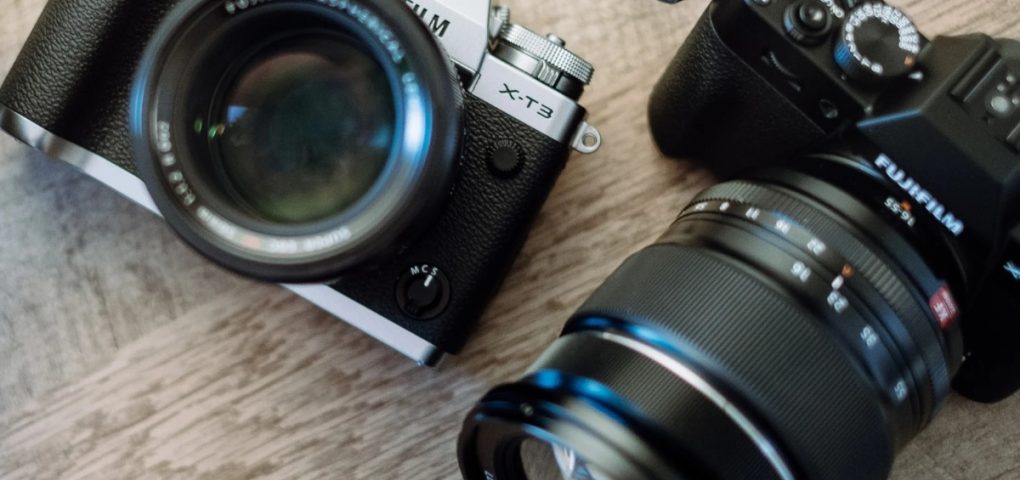Real estate photography is all about showing off a property in the best possible light.
And it is a niche within the photography world that is growing in popularity. With the rise of online real estate listings, many homebuyers and renters are now turning to the internet to find their perfect home. As a result, real estate professionals need high-quality photos to make their listings stand out from the rest.
When it comes to real estate photography, having the right lens is essential. Different lenses offer different features and benefits, so it can be tricky to decide which one is right for you.
In this article, we’ll take a look at the best lens for real estate photography and discuss its specs, features, and pros and cons. So read on to find out more!
Here Are Our Top 8 Best Lens For Real Estate Photography
Canon 24mm Tilt-Shift
Nikon AF-S DX 12-24mm f/4.0 IF-ED Zoom Lens
Canon EF-S 10-18mm f/4.5-5.6 IS STM Zoom Lens
Sony E 10-18mm f/4.0 ED OSS Zoom Lens
Fujifilm XF 10-24mm f/4.0R OIS Zoom Lens
Tokina 12-28mm f/4.0 SD Zoom Lens for Nikon F-Mount
Canon EF16-35mm
Sigma 12-24mm f/4 DG HSM Art Lens
Highlights:
- Tilt-shift feature for more flexibility in interior photography
- Ultra-Low dispersion and aspherical elements for reduced distortion and fringing
- Subwavelength coating to minimize flare and ghosting
- Allows you to create optical illusions that make rooms appear smaller than they actually are
- Excellent low-light performance allows you to capture stunning interior shots even in dimly lit areas.
Canon 24mm Tilt-Shift Lens
Interior real estate photography can be a bit of a challenge, especially if you’re working with a limited amount of space. This is where the tilt-shift feature on your camera can come in handy. By tilting the camera lens, you can create an optical illusion that makes the subject appear smaller than it actually is.
This can be helpful for getting a wider view of a room without having to move your camera back too far. Additionally, the tilt-shift feature can also help to reduce distortion and give your photos a more natural look.
So if you’re looking to take better interior photos, be sure to give Canon’s 24mm lens a try. Keep in mind that the tilt-shift feature is not available on all cameras.
The Canon 24mm also has four Ultra-Low dispersion elements and one aspherical element, which help reduce color fringing and chromatic aberrations and minimize spherical and distortion.
The subwavelength coating suppresses flare and ghosting for greater contrast and increases color neutrality. Overall, the Canon 24mm f/1.4L II USM Lens is a great option for real estate photography thanks to its suitable aperture, tilt-shift capabilities, and high image quality.
Pros:
- Great image quality
- Tilt-shift capabilities
- Reduced distortion and fringing
Cons:
- Not available on all cameras
Highlights:
- 2 Extra Low Dispersion glass elements and 3 aspherical lens elements for superior optics
- Wide autofocus zoom range with f/4 maximum aperture
- Rounded diaphragm and 11.8-inch close-focus distance
- Canon EF-S 10-18mm f/4.5-5.6 IS STM Zoom Lens
- Lightweight construction,
- Optical image stabilization
- Quiet autofocus motor.
Nikon AF-S DX 12-24mm f/4.0 IF-ED Zoom Lens
The Nikon AF-S DX Lens is a great tool for real estate photographers, as it features 2 Extra Low Dispersion (ED) glass elements and 3 aspherical lens elements for superior optics.
With a 12 to 24-millimeter autofocus zoom lens and f/4 maximum aperture, the Nikon AF-S DX Lens is perfect for capturing detailed photos of homes and landscapes.
Additionally, the 11.8-inch close-focus distance makes it easy to take close-up shots of features like fireplaces or hardwood floors. With a rounded diaphragm and an 11.8-inch close-focus distance, the Nikon AF-S DX Lens is perfect for capturing beautiful real estate photos.
Real estate professionals will also appreciate the D-type design, which takes the guesswork out of your photos with its guide to flash and ambient light exposure.
Whether you’re a professional photographer or a real estate agent with a camera, the Nikon AF-S DX Lens is an excellent choice for real estate photography.
Pros:
- Lightweight and portable
- Optical image stabilization for better low light performance
- Quiet autofocus motor for smooth and silent operation
Cons:
- Limited zoom range may not be suitable for all real estate photography needs.
Highlights:
- Ultra-wide zoom lens with 1:4.5-5.6 maximum aperture
- Focal length range of 10-18mm for expansive shooting options
- Built-in image stabilization for hand-held shooting
- Quiet autofocus motor for smooth, silent operation.
- A versatile and high-performing lens
Canon EF-S 10-18mm f/4.5-5.6 IS STM Zoom Lens
Real estate photography is a specialized field that requires the use of specific equipment to get the best results. One essential piece of equipment is a wide-angle lens, which allows photographers to capture an entire room in a single shot.
The Canon EF-S ultra wide zoom lens is perfect for real estate photography, with a maximum aperture of 1:4.5-5.6.
Its focal length range of 10-18mm is perfect for capturing sweeping landscape shots or tight interiors.
And thanks to its built-in image stabilization system, it’s also ideal for hand-held shooting, making it a versatile tool for real estate photographers. Whether you’re shooting exteriors or interiors, the EF-S 10–18mm f/4.5–5.6 IS STM is a great choice for getting those all-important wide-angle shots.
The lens also features a stepping motor for quiet autofocusing.
Pros:
- Wide zoom range with impressive autofocus capabilities
- Image stabilization for better low-light performance
- Quiet motor for smooth and quiet operation
Cons:
- Limited zoom range may not be suitable for all real estate photography needs.
Highlights:
- Image stabilization
- Ultra-wide angle zoom lens with a minimum focal length of 10mm
- Optical SteadyShot image stabilization for clear and sharp photos
- Super ED glass for excellent image quality.
Sony SEL 10-18mm f/4.0 ED OSS Zoom Lens
If you’re looking for an ultra-wide-angle zoom lens that will help you capture stunning interior shots, the Sony SEL 10-18mm is a great option. With a minimum focal length of 10mm, it gives you a super wide angle of view that is perfect for taking in all the details of a room.
Image stabilization is a key feature to look for in a camera if you want to be able to take clear, sharp photos. With image stabilization, you’ll be able to take pictures without worrying about them being blurry.
As a result, you’ll be able to show potential buyers exactly what the inside of the property looks like – and that could make all the difference in whether or not they decide to buy it.
The Optical SteadyShot image stabilization of Sony SEL1018 ensures that your shots are crisp and clear, even if there is movement in the scene.
And the Super ED glass provides excellent image quality, making this lens a great choice for capturing beautiful interior shots.
Pros:
- Great lens for capturing stunning interior shots
- Superb image quality and sharpness
- Built-in image stabilization for hand-held shooting
Cons:
- Limited zoom range may not be suitable for all real estate photography needs.
Highlights:
- Ultra-wide angle lens with minimum working distance of 0.24m
- Built-in Optical Image Stabilisation for minimizing camera shake
- 14 elements in 10 groups, including 4 aspherical and 4 extra-low dispersion elements for sharp images
- Internal focusing and zoom for steady framing.
Fujifilm XF10-24mmF4 R OIS Lens
The Fujifilm XF10-24mmF4 R OIS Lens is designed for home and interior photography purposes, with a minimum working distance of 0.24 m and an angle of view that goes from 110° to 61.2°.
The lens also features built-in Optical Image Stabilisation, which helps to minimize camera shake when shooting at lower shutter speeds or in low light conditions. With 14 elements in 10 groups, including 4 aspherical and 4 extra-low dispersion elements, the lens can also produce sharp, high-quality images.
And because it uses internal focusing and zoom, the frame remains steady when composing your shots.
Whether you’re shooting wide-angle landscapes or trying to capture the perfect shot of your living room, the Fujifilm XF10-24mmF4 R OIS Lens is a versatile tool that will help you get the job done.
Pros:
- Great lens for home and interior photography
- Built-in OIS for sharp, low-light photos
- Versatile zoom range
Cons:
- Once again limited zoom range may not be suitable for all real estate photography needs.
Highlights:
- Aperture range of f/4-22 for capturing high-quality images, even in low light
- Silent drive-module AF motor for quiet operation
- GMR magnetic precision control sensor for precise focusing
- 77mm filter size for using filters like the Hoya HD2 circular polarizer or UV.
Tokina ATXAF128DXC 12-28mm f/4.0 Pro APS-C Lens for Canon
The Tokina ATXAF128DXC 12-28mm f/4.0 Pro APS-C Lens for Canon is one of the best options out there. With an aperture range of f/4-22, this lens is capable of capturing amazing shots, even in low light conditions.
Plus, the silent drive-module AF motor means you won’t have to worry about your camera making noise when you’re trying to take pictures of a property.
Additionally, the new AF “GMR magnetic precision” control sensor ensures that your shots are always in focus. And with a 19-45mm equivalency in 35mm format, this lens is one of the best options out there for real estate photography.
And with a 77mm filter size, you can use filters such as the Hoya HD2 low-profile circular polarizer or UV without problems.
Whether you’re a professional real estate photographer or just getting started, the Tokina ATXAF128DXC 12-28mm f/4.0 Pro APS-C Lens for Canon is a great choice.
Pros:
- Great lens for professional real estate photography
- Lightweight and compact design for easy portability
- Superb image quality and sharpness
Cons:
- Limited zoom range may not be suitable for all real estate photography needs.
Highlights:
- Ultra-wide aperture range of f/4 to f/22 for capturing clear, well-lit images
- Aspherical elements reduce chromatic aberrations and distortions
- Two ultra-low dispersion elements for clear, sharp photos
- Focal length of 16-35mm for capturing a wide range of shots.
Canon EF16-35mm
Canon EF16-35 MM Lens is a great option for real estate photography thanks to its wide aperture range and aspherical elements.
With a focal length of 16-35mm, this lens is able to capture a wide range of shots, from close-ups of architectural details to sweeping views of an entire property.
Plus, the f/4 aperture allows for plenty of light to enter the lens, ensuring that your photos are clear and well-lit.
With an aperture range of f/4 to f/22, it’s perfect for capturing both interiors and exteriors. Plus, the two ultra-low dispersion elements and three aspherical elements help to reduce chromatic aberrations and distortions.
As a result, you’ll get clear, sharp images that really show off the property in its best light. Whether you’re a professional photographer or just getting started, the Canon EF16-35 MM Lens is a great choice for anyone looking to improve their real estate photography.
Pros:
- Great lens for both interiors and exteriors
- Superb image quality and sharpness
- Compact, lightweight design for easy portability
- One of the best full-frame camera lenses
Cons:
- Limited zoom range may not be suitable for all real estate photography needs.
Highlights:
- Ultra-wide aperture of f/4 for capturing clear, well-lit images
- Constant maximum aperture for fast shutter speeds
- Improved zoom range with zero distortion
- Autofocus motor and image stabilization for superior performance.
Sigma 12-24mm f/4 DG HSM Art Lens
Last on our list is the the Sigma 12-24mm F4 DJ HSM Art Lens is a much-anticipated update to Sigma’s line of ultra-wide angle lenses. With a constant maximum aperture of F4 and an improved zoom range, this lens is ideal for landscape or architecture photography.
One of the most impressive features of this lens is its zero distortion, which allows for shots with incredible perspective.
The new HSM motor also makes this lens one stop brighter than its predecessor, making it perfect for use with faster shutter speeds.
The build quality is excellent, and it’s a pleasure to use. The autofocus is fast and accurate, and the image stabilization is extremely effective.
It offers excellent performance in terms of chromatic aberration and vignetting, and while there is some distortion at the widest focal length, it’s practically negligible by 16mm.
Overall, the Sigma 12-24mm F4 DJ HSM Art Lens is a top-of-the-line choice for anyone in search of an ultra-wide angle lens.
The only downside is the price tag, but if you’re serious about your photography, this lens is definitely worth the investment.
Pros:
- Excellent performance in terms of chromatic aberration and vignetting
- Exceptional build quality and smooth, responsive controls
- Superb image quality and sharpness
Cons:
- High price tag may be prohibitive for some photographers.
Key Factors to Consider Before Buying a Lens
There are a few key factors to keep in mind when selecting a lens for real estate photography, including:
Type Of Real Estate Photography
First, consider what type of photography you’ll be using the lens for. If you’re primarily interested in landscape photography, for example, then you’ll want to invest in a tilt-shift lens. This type of lens will allow you to create a more realistic image by manipulating the plane of focus. Tilt-shift lenses are designed for full-frame cameras, so if you have a smaller sensor, you’ll need to purchase an adapter in order to use the lens.
Focal Length
A longer/wider focal length will allow you to capture more of the property in each photo, while a narrower/shorter focal length will allow you to capture more detail.
Aperture
The aperture of the lens determines how much light is let in, which can affect the overall exposure of the photo.
A wider aperture will let in more light, while a narrower aperture will result in a darker photo. Tilt-shift lenses have a maximum aperture of f/2.8-f/4, so if you need a faster lens, you’ll need to look elsewhere.
Shutter Speed
The shutter speed determines how long the camera’s shutter is open, which can affect the overall sharpness of the photo. A faster shutter speed will result in a sharper image, while a slower shutter speed can create a blurrier effect.

ISO
The ISO setting determines how sensitive the camera sensor is to light, which can affect the overall noise level in the photo. A higher ISO setting will result in less noise, while a lower ISO setting will produce a grainier effect.
Size and Weight
Finally, you’ll want to consider the size and weight of the lens. A heavier lens may be difficult to carry around, but it will also produce higher-quality images. With these factors in mind, you’ll be able to choose the best lens for your real estate photography needs.
Crop Factor
Crop factor is an important factor to consider before purchasing a lens for real estate photography. Crop factor is the ratio of the dimensions of a camera’s sensor to the dimensions of a 35mm film frame.
A crop factor of 1.5 means that the dimensions of the sensor are 1.5 times smaller than a 35mm film frame. This has the effect of making lenses appear to be more telephoto than they actually are.
For example, a 50mm lens on a crop sensor camera with a crop factor of 1.5 will have an effective focal length of 75mm.
This can be useful for real estate photography, as it allows you to capture tight shots of rooms and building exteriors without having to use a very long lens. However, it is important to keep in mind that crop factor will also affect the field of view and depth of field of your photos.
As such, it is important to experiment with different lenses and crop factors to find the combination that best suits your needs.
By keeping these key factors in mind, you can choose the right lens for real estate photography and produce high-quality photos that will help market your properties effectively.
Frequently Asked Questions
What lens should you use for real estate?
There are a few different lens options that work well for real estate photography. A wide-angle lens can be used to capture more of the scene in a single photograph, while a telephoto lens can be used to capture tighter shots of individual features or rooms.
Additionally, a tilt-shift lens can be used to create an interesting perspective and minimize distortion. Ultimately, it’s important to experiment with different lenses to find what works best for each individual property.
In my opinion, when photographing real estate, it’s important to use a lens with a wide angle of view in order to capture as much of the scene as possible. This will help to show off the property in its entirety and give potential buyers a better sense of its size and layout.
A zoom lens can also be helpful for getting close-ups of specific features or rooms that you want to highlight.
However, it’s important not to go too far into zooming in, as this can make the image appear distorted and unnatural. It’s usually best to keep your shots at moderate levels of zoom so that they look more realistic with zoom lenses.
What size lens is good for real estate photography?
If you are looking to capture large expanses of land, then a wide-angle lens would be the best option. On the other hand, if you are looking to photograph individual rooms or homes, then a telephoto lens would be more appropriate.
Generally speaking, the larger the lens, the more expensive it will be. So it’s important to decide what your budget is and then choose a lens that fits within that budget for shooting real estate. It’s as simple as that.
Is 12mm too wide for real estate?
Shots that are too tight can make a property feel cramped, while those that are too wide can make it seem vast and empty. As a general rule, anything between 12mm and 35mm is a good focal length for real estate photography.
With that said, there will always be exceptions to the rule, so don’t be afraid to experiment until you find what works best for you.
Is an 18mm lens good for real estate photography?
An 18mm lens is a great choice for real estate photography, as it allows you to capture a wide range of the property in a single shot. This can be particularly useful when photographing large properties, such as mansions or estates.
An 18mm lens will also give you a wide field of view, making it easier to capture multiple rooms or outdoor spaces in a single frame.
If you’re serious about real estate photography, then an 18mm lens is definitely worth considering.
Which lens is the best?
So which lens is the best choice for real estate photography? Ultimately, the best lens will depend on your needs and preferences.
Some professional real estate photographers may prefer the ultra-wide zoom of the Canon EF-S 10–18mm f/4.5–5.6 IS STM, while others may find the extended focal range of the Sony E 10-18mm f/4.0 ED OSS Zoom Lens more suited to their needs.
And both of these lenses offer image stabilization, which is essential for capturing clear and sharp photos. For those looking for a high-quality lens that can handle a variety of different shooting situations, the Fujifilm XF10-24 mmF4 R OIS Lens is an excellent choice.
With its wide angle of view and powerful stabilization, it’s perfect for capturing stunning interior shots that will help you sell your home faster.
Conclusion
Real estate photography is one of the most important aspects of marketing a property. Professional quality photos can make the difference between getting a property sold or having it sit on the market for months. That’s why choosing the right camera lens for the job is important.
We hope that by reading this article, we helped you choose among the best lens for real estate photography for you to use!
You Might Be Interested In:













